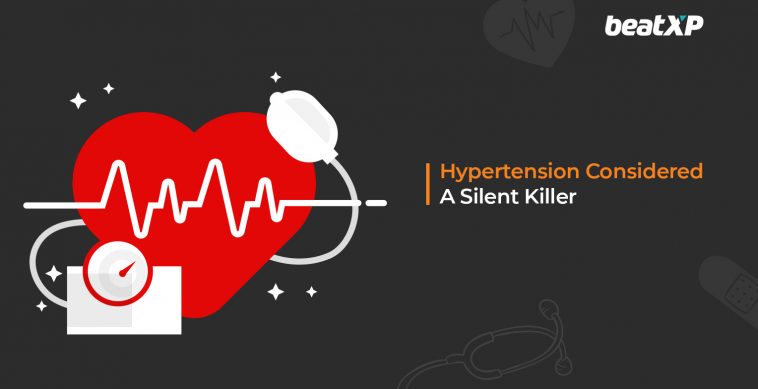More than 1.13 billion people across the world have hypertension. Out of these 1.13 billion, 207 million people reside in India and only 1 out of 5 people have the condition under control. Hypertension, also known as high blood pressure, is one of the major causes of premature death.
Hypertension usually occurs with age, but that doesn’t necessarily mean that you can not develop high blood pressure at an early age. The problem may not seem a big issue but it can be a “Silent Killer” if you continue living an unhealthy lifestyle.
Understanding Hypertension
Hypertension, also known as high blood pressure, is a condition in which the blood pressure inside the arteries increases significantly and poses a risk to the individual’s health. Blood pressure is the force that is generally exerted by the blood on the vessels during circulation.
It is measured in a combination of two numbers, i.e., systolic ( high value) and diastolic ( low value). The systolic number represents the pressure in the blood vessels when the heart contracts. The diastolic number represents the pressure in between two consecutive heartbeats, i.e. when the heart rests.
You can have high blood pressure for years without any symptoms. And as long as the condition goes undetected, the risks to your health will increase gradually. As soon as you find out that you have hypertension, you can work with the doctor to control it effectively.
Reason Why Hypertension is a Silent Killer
Hypertension is considered a “Silent Killer” because the condition has no clear symptoms that would indicate that something is wrong with your body. As this condition develops very slowly over time and is caused due to various factors, it is often misdiagnosed, which leads to serious side effects.
It can cause serious damage to the heart. It can increase the pressure into the arteries at an abnormal rate and decrease the blood and oxygen flow to the heart. Due to the pressure elevation and reduced blood flow, the following problems can arise:
- Chest pain or angina
- A heart attack can occur, which will halt the blood supply to the heart, and the heart muscles start to die due to lack of oxygen. The damage to the heart can be significant depending on the duration the blood flow to the heart is blocked.
- Heart failure can also occur when the heart couldn’t pump enough blood and oxygen to the other vital organs of the body.
- Irregular heartbeat is another problem caused by hypertension that can be fatal.
- Arteries blockage may also occur that can cause bursts in arteries and lead to a stroke.
- Hypertension can also cause kidney damage or severe kidney failure that can also reduce the lifespan of the individual.
Most of these problems arise out of the blue without any symptoms, which is why people often fail to identify the problem and get proper treatment for high blood pressure. Ultimately, due to lack of obvious or apparent symptoms, people stay unaware of the condition and have to face these dire consequences.
What can you do to manage hypertension/ high blood pressure?
Though hypertension isn’t curable, it can be successfully managed with the help of the following methods:
The key to managing hypertension is to monitor your blood pressure and heartbeat rate periodically. This will help you identify if the blood pressure is fluctuating very frequently. The top-grade BP monitors come with color-coded indicators to display the safe and unsafe zone of blood pressure levels.
| Blood Pressure | Systolic (High Limit) mm Hg | And/Or | Diastolic (Lower Limit) mm Hg |
| Normal | Less than 120 | And | Less than 80 |
| Elevated | 120-129 | And | Less than 80 |
| High Level 1 | 130-139 | Or | 80-89 |
| High Level 2 | 140 or higher | Or | 90 or higher |
| Danger Level | Higher than 180 | And/Or | Higher than 120 |
Get a BP monitor so that you can keep track of your blood pressure throughout the day and detect any irregularities to recognize whether your health is at risk or not.
- Make Lifestyle Changes
You need to make significant changes in your lifestyle and follow the doctor’s instructions strictly. The changes include the following:
- Exercise regularly to improve blood flow
- Try to maintain a healthy weight
- Reduce salt intake
- Quit smoking
- Reduce stress
The healthcare provider will provide you guidance on how you can keep up with these changes and minimize the risk of high blood pressure.
- Use Medications
Several medications, such as beta-blockers or diuretics can be prescribed by the doctor to reduce the blood pressure in the arteries and heart. But make sure that you only take prescribed medications.
- Interventional Procedures
Currently, doctors are also researching utilizing interventional procedures that can be helpful to minimize the risk of developing serious conditions due to hypertension. For instance, a procedure called renal denervation is being tested to safely lower blood pressure when lifestyle changes or medications are ineffective.
The Bottom Line
The best thing you can do about hypertension is to know your numbers and act on them accordingly.
People with lower risks should visit their primary care provider at least every two years. If you are a person older than 40, or a person with higher risk factors of having hypertension, then you should get it checked multiple times throughout the year. Or you can opt for a simpler option and buy a BP monitor and do it yourself.


